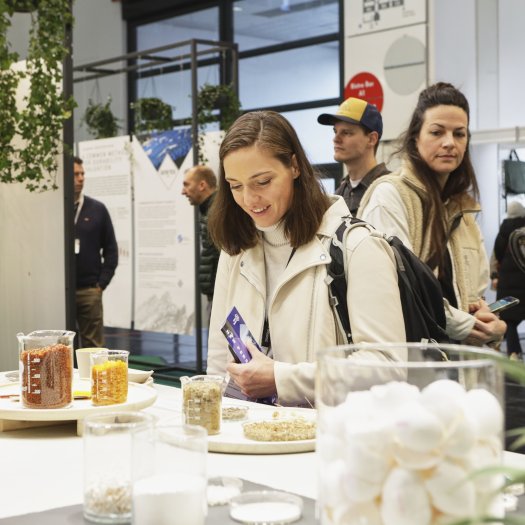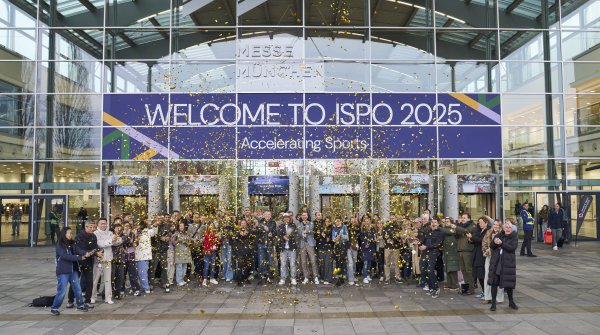- Sales figures: How can the industry get back on track?
- Sales in Asia: How is the sports market developing in China?
- Clever customers: How can we encourage our customers to make more sustainable purchasing decisions?
- Everyone outdoors: How do we tap into new outdoor target groups?
- Shopping Challenge: How do we get people to the party?
- Junior staff concerns: How do we find enough qualified personnel?
- Après ski: how can winter sports achieve a sustainable transformation?
- Sustainable games: Will people accept our measures?
- eSports Paradox: How can we bring the online world to life offline?
- Downsides of the boom: How can new padel facilities be built quickly?
"The market is consolidating"; "Companies with good management will now prevail"; "The demand is there, but online sales in particular are no longer a no-brainer"; "We also have to win over customers offline again"; these were all statements that describe the perception of the market situation at ISPO Munich 2023. The good news is that long-term growth can generally be expected in the sports, health and fitness sector, as McKinsey's figures show.
However, the economic crisis is also hitting the sports industry hard. According to many industry participants, it is now important to reduce the number of SKUs, to make the product range clearer and to create a successful combination of online and offline touchpoints. To do this, each brand must know, identify and serve its target group(s) precisely. Then the sales strategies can also look very different. This also became clear at ISPO Munich.
For example, the elho brand is focusing on a high proportion of D2C sales for its comeback and wants to use stores more as touchpoints for brand awareness and brand building, whereas supernatural, for example, sees the retailer network as the central backbone for sales. The company's own website is more of a first digital touchpoint to showcase the entire collection. Uppervoid, a newcomer from China and on its way into the European market, relies on direct sales to retailers and a network of distributors to establish the brand in Europe.
The sports and outdoor market in the People's Republic of China continues to develop at a pace that is often hard to comprehend from a Western perspective. This is also due to the efforts of the government in Beijing to promote the health and satisfaction of the population with activities such as hiking, cycling and camping. In October 2023, it therefore adopted an ambitious "Action Plan to Promote the Construction and Improvement of Outdoor Sports Facilities". The aim is to build 10,000 new campsites across the country by 2025 alone.
The interest of the people in China and the potential of the market is enormous - if you consider that there are 14,298 mountain peaks in the People's Republic that are between 3,000 and 5,000 meters high. On the online platform XiǎoHóngShū, the Chinese Instagram, around 2.5 billion posts about hiking and 6 billion about camping were viewed between January and October 2023. Experts still see great potential for Western companies in the clothing and footwear market. But more specialized disciplines such as tennis and frisbee are also growing strongly.
The faster the product cycles in China, the more important it is to address customers precisely and individually. This works best with local branches or in cooperation with Chinese partner companies.
One of the biggest challenges on the road to a more sustainable, circular economy is communication with end customers. How can you talk about your efforts in a transparent and honest way? And in such a way that it reaches the end customer? Many brands and retail organizations are asking themselves these questions.
Ben Blischke, Senior Manager ESG Product and Circularity at Intersport International, also points out that there are many different national regulations and laws. Many industry players, such as Vaude, Houdini and Rab/Lowe Alpine, therefore welcome the fact that the EU is developing stricter regulations with the Green Deal, which will prohibit greenwashing in particular with the Green Claims Directive. As an EU-wide standardized instrument, the Digital Product Passport will create more transparency for customers.
At the same time, brands need to work closely with the retailer network and provide retailers with the tools they need to provide advice. Ingredient brands are also thinking about this. For Debbie Read, Head of Corporate Communications and CSR at Equip Outdoor Technologies, it is clear that this is a long and gradual process: "Retailers need to understand that there is no such thing as a 'green' or 'non-green' product." The topic is more complex, said Read.
In order for customers to perceive and understand these complex issues, there is a lot of potential in storytelling. This "buzzword" was heard again and again when contemporary communication and successful marketing were discussed at the trade show. The task now is to put this into practice.
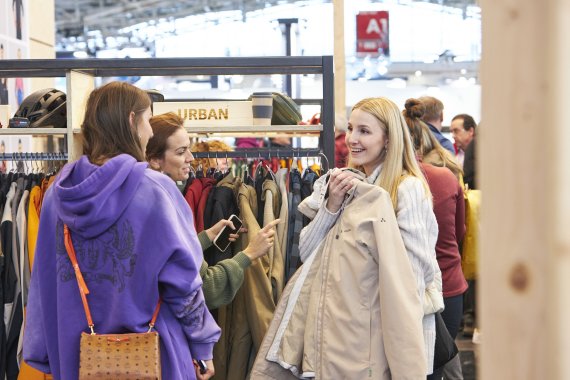
The industry is still characterized by the stereotype of "white and wealthy". Paradoxically, OutDoor is not always accessible to everyone; mountain sports, especially winter sports, are generally reserved for the financially better-off. This is a complex issue that must at least be actively addressed through inclusive communication. For example, through low-threshold events that give new groups access and enable them to experience the outdoors. Communities and services can also bring together athletes with a similar mindset, help to educate or create their own groups - such as the Merrell Hiking Club for women or knowledge and training courses in the area of mountain safety or tour planning, such as the Ortovox protACT Online Community. A simple exchange between like-minded mountaineers from different backgrounds can also help to break down stigmas. If feedback is transferred directly from the community into the products, a win-win situation is created, as in the case of LaMunt's well thought-out collections for women.
The famous four Ps from the marketing textbook - product, price, promotion, place - have been attracting fewer and fewer people to sports and outdoor retailers' stores for some time now. That's why the big question in the face of company takeovers, insolvencies and the death of retailers in city centres is how to still attract customers to your store in 2024. "The P's from the marketing mix are just hygiene factors," said Maximilian Riebel from BBE Handelsberatung at ISPO Munich. He suggests replacing them with new P's: Purpose, Passion, Platform and Play. Behind these are a deeper sense of the company's existence, passionate employees, marketing via new channels such as TikTok and a playful involvement of customers and their families.
"What if the way we have recruited talent up to now is completely outdated?" This question is at the heart of the challenges facing the sports industry in 2024. It is no longer just about finding employees - now it is crucial to inspire them with unique offers and retain them in the long term. ISPO Munich made it clear: creativity and innovation are more in demand than ever. Paul-Edmond Betremieux from BOOST puts it in a nutshell: "Don't wait for talent, take the initiative! Actively show what your company has to offer - 365 days a year, not just during recruitment phases."
For companies, this means going full throttle in terms of visibility, culture and prospects. Investment in further training and the well-being of the workforce is essential. The sports industry is faced with the task of not only attracting new talent, but also finding and strengthening its voice as an employer brand. It is about revolutionizing corporate structures and working models and creating benefits that offer real added value - an exciting journey that paves the way for a forward-looking world of work.
In no other area of sport is the pressure to change as high as in winter sports: after all, climate change poses existential problems for the Nordic and Alpine disciplines. At the same time, images of excavators on glaciers are going around the world and scratching the image. The CO2 snow trail therefore urgently needs to be reduced. Some ideas were discussed at ISPO Munich in the symposium "Your winter. Your sport." symposium: Travel emissions could be reduced through attractive travel offers. Snow groomers should increasingly run on synthetic fuels. And the energy for gondolas and artificial snow is increasingly coming from renewable sources. "The death knell doesn't have to be rung yet," said DSV Managing Director Stefan Schwarzbach confidently. Especially as the hardware sector now also has some sustainable products on offer, such as the "Essential" recycled ski from Rossignol.
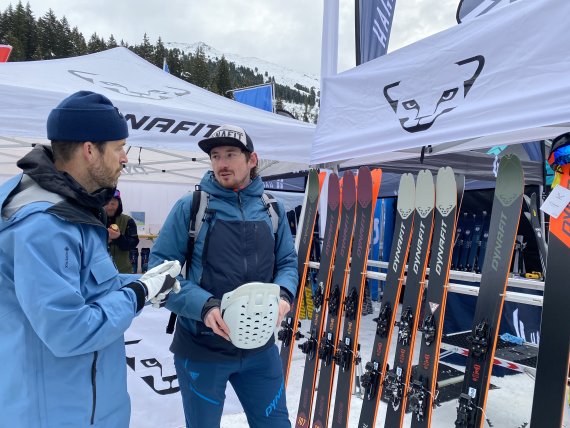
The 2024 Olympic and Paralympic Games in Paris have put sustainability at the top of their agenda. 95% of the sports venues already exist or are only temporary, low-emission mobility is being promoted and the "Terre des Jeux 2024" initiative is intended to ensure that the whole of France benefits from the Games in the long term. Everything is actually great, but Damien Combredet, Deputy Director of "Impact & Heritage Paris 2024", expressed his concern at ISPO Munich: "We are doing our best to tackle climate and environmental problems and to have the smallest possible carbon footprint. But we don't yet know whether fans and athletes will accept having less meat on their plates. And whether the media stations, who all prefer to be powered by fuel-powered generators to guarantee transmission, will accept being connected to the grid?"
Many industries have some catching up to do when it comes to digitalization and are looking for ways to do more online. The situation is different in eSports, where brands and teams are asking themselves how they can better bring the community from the online world together in real life. "Gamers don't just want to meet in person at big events, but also in everyday life. However, there is a lack of structures and spaces for this," said Vivien Mullant from the "Unicorns of Love" on the ISPO stage. Some clans are therefore opening their gaming houses and offering event spaces, for example. There are opportunities here for traditional clubs and sports associations to appeal to parts of Gen Z with corresponding offers.
Enthusiasm is high, demand is huge - padel is on fire! With over 1,500 clubs and 15,300 courts, Spain is currently far and away the leader in padel mania. Xavier Trallero Gulliot from the Sports Hub Barcelona is keeping a close eye on developments and was enthusiastic at ISPO Munich: "Spain is the hotspot for paddle worldwide. An incredible community has formed here in a short space of time. Italy and Sweden also love the sport. That's a great development." And Germany? Here we are only just at the bottom of this steep curve, but the padel boom is coming. The challenges for next year are huge, as there are currently only around 250 padel courts in Germany - twice as many as a year ago. But space in big cities is limited and expensive. "That's a big problem. Four new courts are currently being built in the east of Munich. But that's obviously far too few," says Filip Kollar from Playtomic, expressing his disappointment. He is Regional Manager Europe for the booking software, which covers 75 percent of all paddle clubs worldwide. He is aware of the daily run on the few free padle places in Germany. The supply is still growing too slowly for the increasing demand. That's why it's often still a case of first come, first served.
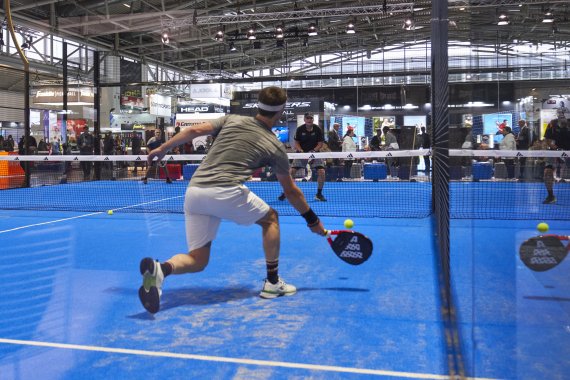

 Sports BusinessSki Mountaineering Goes Olympic: What Milano-Cortina 2026 Means
Sports BusinessSki Mountaineering Goes Olympic: What Milano-Cortina 2026 Means
- ISPO awards
- Mountain sports
- Bike
- Design
- Retail
- Fitness
- Health
- ISPO Job Market
- ISPO Munich
- ISPO Shanghai
- Running
- Brands
- Sustainability
- Olympia
- OutDoor
- Promotion
- Sports Business
- ISPO Textrends
- Triathlon
- Water sports
- Winter sports
- eSports
- SportsTech
- OutDoor by ISPO
- Heroes
- Transformation
- Sport Fashion
- Urban Culture
- Challenges of a CEO
- Trade fairs
- Sports
- Find the Balance
- Product reviews
- Newsletter Exclusive Area
- Magazine
